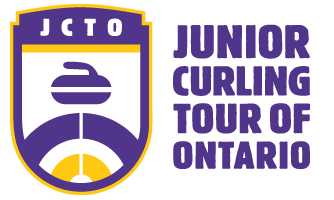JCTO Rules & Guidelines
Competition Guidelines
Junior Slams are self-regulating competitions. Athletes and coaches must guide themselves according to the standards outlined in the following competition guidelines.
Before teams are permitted to play, convenors will check to ensure all teams have:
- Read the Concussion Guidelines and Return to Play Policy
- Read the Junior Slam Series Anti-Bullying Policy
- Read the Sweeping Statement
- Read the Spirit of Curling
- Read the Payment, Waiting Lists, Cancellations and Refund Policy
- Reviewed Curling Canada’s Rules of Curling for General Play
- Reviewed the Event kit for the relevant Slam they are competing in
- Signed and submitted a Participation Agreement Waiver
The Junior Curling Tour of Ontario (JCTO)’s mission is to provide meaningful development for Ontario curlers in the U15, U18 & U20 age categories. It does this by managing an annual tour of curling events in each of these categories where participation in each individual event helps the teams develop and the tour as a whole helps teams progress towards their year end goals, often in the form of preparedness for Provincial qualifiers and championships.
To achieve this goal, the JCTO has established a set of rules and guidelines to ensure that all events on the tour provide a meaningful development opportunity. There are general rules which apply to all age categories, as well as specific rules for U18 & U21 and different rules for U15.
The eligibility rules include a required component which must be complied with, and a recommended component which are suggestions which the JCTO believes are important for making an event easier to run and provide a consistent experience.
To qualify as for the YCTO, all events on the an established set of rules:
To be included in the tour, events must:
- Complete registration no later than 2 weeks prior to the event (to allow for draw creation)
- Use LiveScores for real-time event scoring
- Guarantee a minimum of 3 games
- Schedule no more than 3 games / team / day
- Comply with specific event guidelines for the age category of the event (see below).
It is recommended, but not required, that events:
- Event & Team registration be handled through the Junior Slam Series registration system
- Include a consolation final where possible to align with the JTRS points
- Use the Junior Slam Series standard code of conduct, fair play and media waivers and Rowan’s Law compliance forms
Events on the Junior Tour in the U18 & U20 categories must also follow the following rules:
To be included in the tour, events must:
- Use a round robin pooled-play format leading to some form of playoff.
- Have at least 8-end games.
- Single gender teams in gender specific pools.
- Guarantee a minimum of 3 games.
- Schedule no more than 3 games / team / day.
It is recommended, but not required, that events:
- Use a Skill Based Ranking (SBR) (i.e. team shootout) to break ties in team rankings.
- Avoid the use head-to-head to determine tiebreakers, due to the use of round robin pools.
- Break game ties with a single extra end.
- Run events over 2 or more days.
U15 is a relatively new category for tour events. It is critical that events be designed to create meaningful outcomes for the development of the teams. The Junior Slam Series events in this category are 2-day pooled format events with a championship and consolation game (a possible 6 games over 2 days), however the tour aeea the value of single day events and/or events that do not use a pool format for deterring matchups for U15 competitive curlers.
To be included in the tour, U15 events must:
- Follow the guidelines for a U18/U21 event.
– or –
- Include a minimum of 2, 6-end, regulation games.
- Include an 8-end championship final & consolation final.
- Teams may be open gender.
- Allow 3, 90 second, timeouts in a regulation game.
- Allow coach interaction with the team for a brief discussion between ends.
- Allow 2 timeouts and no extra coach interaction for championship / consolation games.
- Determine the matchups of the first game of the event based on YCTO seeding rules (see below).
It is recommended, but not required, that events:
- Use a Skill Based Ranking (SBR) (i.e. team shootout) to break points-ties for the finals.
- Break game ties in the final with a single extra end.
It is important that these events provide the ability for the two best teams to face each other in the final, while also giving less experienced teams the ability to gain experience at their own level. For this reason all teams in a competitive draw will be ranked based on earned JTRS points in the current season. Where two teams have the same JTRS points (including where teams have no JTRS points), teams will be ranked based on total age fo the team members. Based on this ranking teams are divided into groups with the highest ranked team in a group playing the lowest. and so forth. For a 8 – 12 teams, divide the teams into 2 groups. For 14 teams use 3 groups and for 16 teams, divide into 4 groups of 4 teams each.
As an example, for a 6-sheet, 12 team group, would look like this
|
Group 1 |
Group 2 |
||||
|
Matchup 1 |
Matchup 2 |
Matchup 3 |
Matchup 1 |
Matchup 2 |
Matchup 3 |
|
1 vs 6 |
2 vs 5 |
3 vs 4 |
7 vs 12 |
8 vs 11 |
9 vs 10 |
Assigning teams for subsequent games is left to the event organizer.
Events may choose to follow the Junior Slam Series rules of play found here, including the use of Junior Slam Series standard waivers (Fair Play, Anti-bullying, Media releases etc.). If permissible by the host club, the Junior Slam Series Rowan’s Law may also be used.
Rowan's Law Resources
Rowan’s Law requires that all Athlete’s under the age of 25, and (in the case of Athletes under the age of 18, ALL of their legal guardians, review the training materials at least once per year.
The current training materials can be found by clicking on the following links.
After you have reviewed the appropriate booklet, you must complete and sign the ‘Code of Conduct’ form that is included with the Junior Slam Series waiver.
For more information on Rowan’s Law please visit: ontario.ca/concussions

